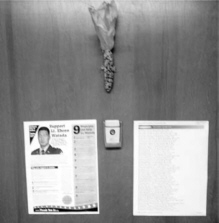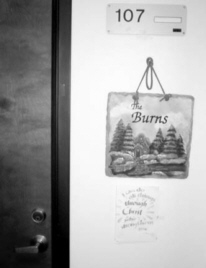|
||||
|
|
|
|||
| Home | Subscribe | Back Issues | The Organization | Volunteer | Do Something | ||||
|
||||
|
Judge: No Ban on Apartment Door SignsHousing agency appeals verdictopinion and photos by Keith Gormezano




Recently, the public housing agency Seattle Housing Authority (SHA) lost a First Amendment case regarding a new rule prohibiting public housing tenants from posting signs on the outside of their apartment doors. The agency is appealing the ruling. SHA dropped an earlier version of the rule prohibiting signs in windows. According to SHA spokesman Virginia Felton, "The legal issue was whether a tenant has a possessory right to the outside of the door." However Eric Dunn of the Northwest Justice Project, the attorney for the tenants pointed out a ruling that held that a door was part of an apartment. First, as a former apartment and property manager, I can say that it has always been considered the industry trade standard that apartment doors belong to the tenants. When landlords sign a lease with residents, we give up some of our rights associated with property ownership. Our society sees the door as a fundamental part of our homes via traditions such as carrying the partner across the threshold and giving people keys to their home. In my senior-and-disabled SHA building, several tenants have posted notices addressed to SHA employees telling them not to enter without the tenant being present. Others have posted a three page list of US soldiers killed in the Iraq war, wreaths and holiday decorations, personal items, and religious affirmations (such as "all that I have is through Christ"). A few leave birthday cards and party invitations on their neighbor's doors. On my own door, I have a corn cob reflecting my Hispanic heritage and a mezuzah (a Jewish religious icon). Clearly, the doors belong to the tenants. Second, SHA says one reason behind the rules is that they don't want clutter in the common areas. The United States Supreme Court has allowed housing authorities to restrict speech in the hallways and common areas of their buildings as those areas are considered public property. Yet the tenant's attorney noted that government can't take away rights for the sake of aesthetics. I agree. SHA's position is hogwash. In my building, there are four duplicate signs posted next or near to each other by management. One reminds tenants and visitors not to smoke. The second reminds us to shut the front door and not let in strangers (with candy?) or the visitors of other residents. The third is for the date of the next fire alarm test. And the fourth tells us that the resident manager is going on vacation. Maybe they ought to walk the talk first. If there is any "visual clutter," SHA is the cause! Third, at issue in this case is whether or not the front doors are part of the hallways and therefore public property or part of the apartments. James Fearn, the Housing Authority's attorney argued that because the lease is silent on who possesses the doors, the Housing Authority's responsibility and liability for the doors should compel the court to consider them as part of the hallway. I disagreed. It is the responsibility of the writer of the lease to make that issue clear. I have always understood that under contract law, the drafter of an ambiguous clause in a contract will have that unaddressed clause held against them. Fourth, the entry door to my apartment is mentioned in the damage check-in list that SHA signed with me. This means that I would be responsible for damage to it, not the agency. If I were to sustain a break-in, I would be the one filing criminal charges and rental insurance (that SHA encourages us to get) for reimbursement for the door, not SHA. If the outside of my apartment door is in the "common area." then why am I responsible for any damage to it? I also note that I am not allowed to make copies of my building's key to the main entrance and common areas. If I don't own my door, then why do I have the right to provide extra keys to my door to anyone I choose but not the keys to my building? Fifth, SHA gives notices to individual tenants by taping them to our doors. This indicates that SHA does not see the outside of the door as the common area. If they did, such notices could be seen as a violation of tenant privacy as everyone could read them. This decision is important. Unlike the private sector, if I don't like the way my public housing management is treating me, I don't have other alternatives to move to. The supply of low-income housing is extremely limited. I live in it as a matter of financial necessity. It isn't the same as private housing where I can move to another apartment complex managed by a progressive property owner who supports free speech. Unfortunately, by appealing the ruling, SHA is wasting financial and legal resources that could be used instead to benefit their tenants. Keith Gormezano is a retired former apartment and property manager and office manager and an alumnus of Seattle University Law School. He can be reached at bb822@scn.org or (206) 789-8328. |
|
